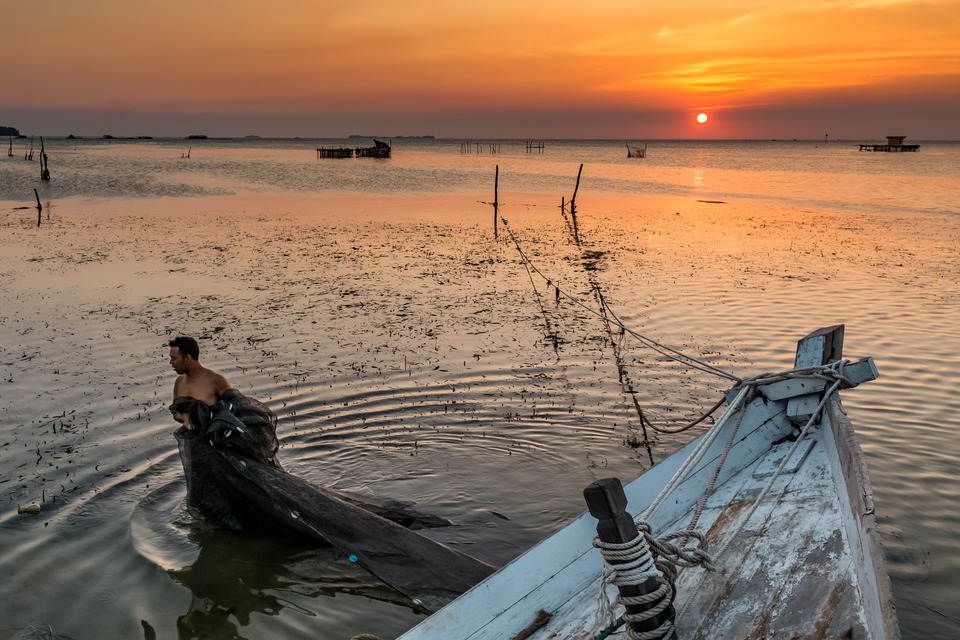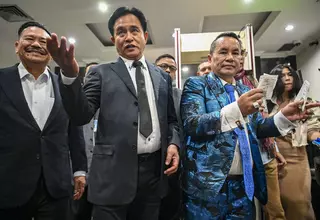Blue Bonds: New Initiative for Our Oceans

As the world's largest archipelago, which includes 6.4 million square kilometers of ocean that lie at the heart of the Coral Triangle, Indonesia is blessed with outstanding ocean resources. The country has the potential to become a global maritime nexus by harnessing its blue economy: a combo of sustainable fishery, marine renewable energy, waste management and tourism.
The blue economy is estimated to generate between $3 trillion to $6 trillion in revenues per year globally. If the world's oceans were counted as a country, it would stand as the world's 7th largest economy.
The blue economy can be crucial for Indonesia – especially revenues from the fishing industry and marine-coastal tourism – to act as a catalyst for growth. The fishing industry alone generates over Rp 102 trillion ($7.2 billion), 2.7 percent of Indonesia's gross domestic product, in the first quarter of this year. The fisheries sector contributes more to Indonesia's gross domestic product than it does to the GDP of other Asean member states, such as Malaysia (1.1 percent), the Philippines (1.5 percent) or Thailand (0.7 percent).
A 2018 United Nations Food and Agriculture Organization (FAO) report placed Indonesia as one of the world's major marine producers, with a total of 5.9 million workers in its fisheries and aquaculture sectors.
Indonesia is also well known throughout the world for its myriad of exotic marine-coastal tourist destinations. A 2017 Spalding research estimated that Indonesia's marine-coastal tourism industry could be worth $3.1 billion annually.
Harnessed properly, the blue economy can boost Indonesia's economic growth and help it escape the middle-income trap.
However, reckless overfishing is estimated to cost the country $4 billion a year in lost revenues. The problem is exacerbated by the tons of marine debris that are blighting our oceans and coastlines.
A 2015 Science Magazine article claimed that Indonesia was the world's second-largest marine plastic polluter, with an estimated 1.3 million metric tons of plastic debris originating from the archipelago ending up in the world's oceans.
Another study by Making Oceans Plastic Free estimated that the hidden cost of plastic pollution in the world's oceans had reached $2.91 billion annually.
If the current, inadequate, fishing and waste management practices in Indonesia continue, edible fish stocks from Indonesia's oceans will soon be depleted, and there will be no more exotic seas or beaches to visit since they will have been destroyed by mountains of marine debris.
Recovering our oceans should not be merely an effort to meet the 14th target in the United Nations' Sustainable Development Goals. It is also a key development challenge that will affect our economy and livelihood in the future.
According to the FAO, rebuilding overfished stocks could increase fishery production by 16.5 million tons, which would undoubtedly increase the fisheries sector's contribution not only to the economy but also to the well-being of Indonesia's millions of fishermen.
The Indonesian government has been trying to unravel these complex threads of ocean problems for years. It has tried to impose stricter law enforcement to reduce overfishing and issued the National Action Plan on Sea Debris in 2017, which aims to dramatically reduce marine debris by 70 percent in 2025.
President Joko "Jokowi" Widodo even has an ambitious plan to build 12 waste-to-energy power plants in the next three years to solve the country's burgeoning plastic waste problem.
The key challenge in implementing these programs is, as always, financing. Large-scale investments are required to execute national plans and programs related to Indonesia's blue economy.
The National Action Plan on Sea Debris alone needs an annual budget of $1 billion. Constructing the waste-to-energy power plants will cost the Jokowi government $1.42 billion.
Unfortunately, the 2019 state budget only sets aside Rp 5.4 trillion ($386 million) to be distributed through relevant ministries to fund activities in the maritime and fisheries sectors.
Considering Indonesia's low tax ratio, it would be near to impossible to finance its blue economy solely through the state budget. Without a huge and steady financial resource, we will run out of juice before we even get close to our targets.
Indonesia needs unorthodox financing innovations, such as blue bonds, to develop our blue economy.
The Republic of Seychelles is the world's blue bond pioneer, releasing its first batch of the thematic bonds in October 2018 and raising $15 million to finance its blue economy. As part of the issuance, they included measures to aid small-scale artisanal fishermen and recover fish stocks.
Since then, many global financial institutions have followed suit by issuing their own blue bonds. Nordic Investment Bank launched its Nordic-Baltic Blue Bond in January 2019, raising 2 billion Swedish krona ($213 million) for the Scandinavian country's water resource management and protection programs. In April, Morgan Stanley and the World Bank issued $10 million in blue bonds as part of a joint effort to solve the world's marine debris problem.
If the Indonesian government and the private sector can work together in issuing blue bonds, the country may have enough financial resources to harness our blue economy potential.
Blue bonds can encourage scaling up of investments in renewable energy, sustainable fishery, waste management and marine-coastal tourism in Indonesia.
Taking cues from other thematic bond issuances (e.g., green bonds), blue bond issuances are more than likely to benefit not just the government, but also local coastal communities and corporations.
The government will make financial savings and extra capital inflow to be invested in the blue economy sector. It will also add variety to Indonesia's financial instruments, which in turn will help deepen the financial sector. Local communities will be more productive if the oceans can recover. Meanwhile, corporations can leverage the impact of their investment.
A Harvard Business Review study from 2018 shows companies that issue thematic bonds earn excellent reaction from the stock market, marked improvements in their financial and environmental performance and an increase in stock ownership by long-term investors.
Amid all the fiscal limitations in developing Indonesia's blue economy, blue bonds stand apart to pave the way for Indonesia to improve its relationship with its oceans. Blue bond issuance is another example of the influential role the capital market can play in attracting investors, harnessing the Indonesian blue economy while also preserving the most valuable thing on this pale blue dot, the ocean.
Muhammad Fajar Nugraha is an analyst at the Finance Ministry's Center of Financial Sector Policy and Fiscal Policy Agency. The article is his personal opinion.
Tags: Keywords:POPULAR READS
Nissan to Make Next-Generation EV Batteries by Early 2029
Solid-state batteries are widely seen as the next step for EVs.Airlangga Set to Extend Leadership in Golkar After Election Success
Under his leadership, Golkar rose to the second position in the legislative polls and successfully made Gibran the elected vice president.Yellen Says Iran's Actions Could Cause Global 'Economic Spillovers'
Iran's missile attack on Israel early Sunday came in response to what it says was an Israeli strike on Iran's consulate in Syria.Takeaways from Prabowo's Responses to Legal Motion Contesting His Election Win
Part of the argument addresses the claim that the candidacy of Gibran Rakabuming Raka, Prabowo’s running mate, is unlawful.Prabowo Camp Cites ‘Procedural Error’ in Legal Challenge by Rival Candidates
The Constitutional Court's main task is to address alleged discrepancies in vote tallies, which neither of the plaintiffs challenged.Popular Tag
Most Popular






















